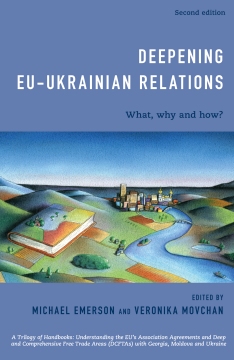
Additional Information
Book Details
Abstract
For Ukraine, the signing of the Association Agreement and the DCFTA with the European Union in 2014 was an act of strategic geopolitical significance. Emblematic of the struggle to replace the Yanukovych regime at home and to resist attempts by Russia to deny its ‘European choice’, the Association Agreement is a defiant statement of Ukraine’s determination to become an independent democratic state.
The purpose of this Handbook is to make the complex political, economic and legal content of the Association Agreement readily understandable. This second edition, published two years into the Agreement’s implementation, adds new value, charting Ukraine’s progress in putting the Agreement into effect.
Two teams of researchers from leading independent think tanks, CEPS in Brussels and the Institute for Economic Research and Policy Consulting (IER) in Kyiv, collaborated on this project, with the support of the Swedish International Development Agency (Sida). This Handbook is one of a trilogy examining similar Association Agreements made by the EU with Georgia and Moldova
These Handbooks offer a one-stop guide to the Association Agreements – the authors have painstakingly analysed the incredibly complex Agreements to deliver a compact and accessible overview to all those who need to grasp their contents. The national teams also shed light on the salience of the content for domestic reforms. Even though the Handbooks are not meant to be read like a book, the reader who does so is rewarded with a panoramic overview of the sheer scale and ambition of the AA-DCFTA. The Handbooks offer a plethora of pivotal insights into the Agreements while at the same time they throw up a number of important questions. A ‘bible’.
Kataryna Wolczuk, Centre for Russian, European and Eurasian Studies, University of Birmingham
Michael Emerson is Associate Senior Research Fellow at the Centre for European Policy Studies in Brussels.
Veronika Movchan is Academic Director at the Institute for Economic Research and Policy Consulting (IER), Kyiv.
Table of Contents
| Section Title | Page | Action | Price |
|---|---|---|---|
| Deepening EU-Ukrainian Relations | Cover | ||
| CONTENTS | v | ||
| List of Tables, Figures and Boxes | vi | ||
| Abbreviations | viii | ||
| Preface | xi | ||
| Summary | 1 | ||
| Part I. Political Principles, the Rule of Law and Foreign Policy | 13 | ||
| 1. Political principles | 14 | ||
| 2. Rule of law and movement of people | 25 | ||
| 3. Foreign and security policy | 33 | ||
| Part II. Deep and Comprehensive Free Trade Area | 40 | ||
| 4. Market access for goods | 41 | ||
| 5. Trade remedies | 54 | ||
| 6. Customs services | 58 | ||
| 7. Technical standards for industrial goods | 67 | ||
| 8. Food safety regulations | 80 | ||
| 9. Services | 91 | ||
| 10. Public procurement | 103 | ||
| 11. Intellectual property rights | 116 | ||
| 12. Competition policy | 127 | ||
| 13. Statistics | 135 | ||
| Part III. Economic Cooperation | 140 | ||
| 14. Macroeconomic context and financial assistance | 141 | ||
| 15. Financial services | 149 | ||
| 16. Transport | 162 | ||
| 17. Energy | 173 | ||
| 18. Environment | 186 | ||
| 19. Digital sector | 198 | ||
| 20. Consumer protection | 206 | ||
| 21. Company law | 211 | ||
| 22. Agriculture | 217 | ||
| 23. Employment and social policy | 226 | ||
| 24. Education, training and culture | 236 | ||
| 25. Science, technology and space | 240 | ||
| 26. EU agencies and programmes | 246 | ||
| 27. Cross-border cooperation | 251 | ||
| 28. Civil society | 258 | ||
| Part IV. Legal and Institutional Provisions | 264 | ||
| 29. Dispute settlement | 265 | ||
| 30. Institutional provisions | 270 |
